Planning worship?
Check out our sister site, ZeteoSearch.org,
for 20+ additional resources related to your search.
- |
User Links
Person Results
‹ Return to hymnal
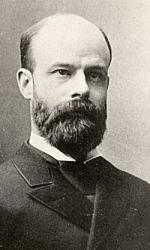
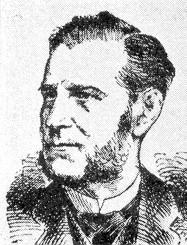
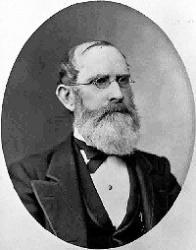
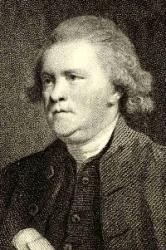
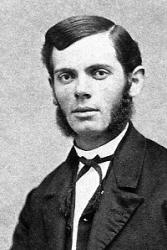

Export as CSV
Franz Xaver Schnyder von Wartensee
1786 - 1868 Person Name: X. S. Von Wartensee, 1786-1868 Hymnal Number: 198 Composer of "HORTON" in A. M. E. C. Hymnal
Franz Xaver Schnyder von Wartensee
W. G. Ballantine

1848 - 1937 Person Name: William G. Ballantine Hymnal Number: 581 Author of "God Save America" in A. M. E. C. Hymnal
W. G. Ballantine
Darius E. Jones
1815 - 1881 Hymnal Number: 57 Composer of "[Silently the shades of evening]" in A. M. E. C. Hymnal
Darius E. Jones
Henry Hiles

1826 - 1904 Hymnal Number: 23 Composer of "ST. LEONARD" in A. M. E. C. Hymnal Born: December 31, 1826, Shrewsbury, England.
Died: October 20, 1904, Worthing, England.
Hiles was educated at Oxford (BMus 1862, DMus 1867). He played the organ at Shrewsbury, as his brother’s deputy (1846); Bishopwearmouth (1847); St. Michael’s, Wood Street (1859); the Blind Asylum, Manchester (1859); Bowden (1861); and St. Paul’s, Manchester (1863-67). He lectured in harmony and composition at Owen’s College in Manchester (1867) and Victoria University (1879), and was Professor at the Manchester College of Music (1893). He also conducted musical societies in Lancashire and Yorkshire, and owned and edited the Quarterly Music Review (1885-88). He retired in 1904, moving to Pinner, near Harrow. His works include:
Twelve Tunes to Original or Favourite Hymns, 1867
Harmony of Sounds, three editions: 1871, 1872, 1879
Wesley Tune Book, 1872 (editor)
Grammar of Music, 1879
First Lessons in Singing (Manchester: Hime & Addison, 1881)
Part Writing or Modern Counterpoint (Novello: 1884)
Harmony or Counterpoint, 1889
Harmony, Choral or Counterpun
--www.hymntime.com/tch/
Henry Hiles
C. C. Cox

1816 - 1882 Person Name: Christopher C. Cox Hymnal Number: 57 Author of "Silently the Shades of Evening" in A. M. E. C. Hymnal Cox, Christopher Christian, M.D., was a Maryland physician, and long prominent in the public service. Born at Baltimore, Aug. 28, 1816, and graduated at Yale College, 1835. He practised medicine in Baltimore, 1838, and in Talbot County, Maryland, 1843. In 1861 he became Brigade Surgeon U. S. A., and resided in Washington. He died Nov. 25, 1882. He was a member of the Protestant Episcopal Church. His hymns in common use are:—
1. Silently the shades of evening. Evening. Written in 1840 or 1846, and published in Woodworth's Cabinet, 1847, with music. It is much used in American hymn-books.
2. The burden of my sins, 0 Lord. Lent. Appeared in the Cantate Domino, Boston, 1859, together with two additional originals and two translations. These hymns are unknown to English collections. [Rev. F. M. Bird, M.A.]
--John Julian, Dictionary of Hymnology (1907)
C. C. Cox
William Mason

1725 - 1797 Hymnal Number: 591 Author of "Again Returns the Day of Holy Rest" in A. M. E. C. Hymnal Mason, William, M.A., was born at Kingston-upon-Hull, 1725, and educated at St. John's College, Cambridge. He was some time a Fellow of Pembroke Hall. On taking Holy Orders he became Rector of Aston, and Precentor of York Minster. He died April 5, 1797. His poetical writings, including Poems, Tragedies, Odes, and Hymns, published at intervals, were collected and issued in 4 vols. in 1811 as The Works of William Mason, M.A., Precentor of York, and Rector of Aston. His hymns, few in number, include, "Again the day returns of holy rest”; "Soon shall the evening star with silver [silent] ray", &c. These are in vol. i. of his Works.
-- John Julian, Dictionary of Hymnology (1907)
=======================
Born: February 12, 1725, Kingston-upon-Hull, England.
Died: April 7, 1797, Aston, England. There is a plaque to his memory in Poet’s Corner, Westminster Abbey (next to Milton), with a bas relief image of him.
Pseudonym: Malcolm MacGregor.
Mason was educated at St. John’s College, Cambridge, and became fellow of Pembroke College in 1749. After taking Holy Orders, he became Rector of Aston (near Rotherham), Yorkshire, in 1754. He was appointed Prebend of Holme in York Minster in 1756, Canon Residentiary in 1762, became Precentor and Prebendary of Driffield in 1763. He also served as literary executor for poet Thomas Gray. His works include:
Musaeus, 1744 (a lament for Alexander Pope, in the style of Lycidas)
Isis, 1748
Elfrida, 1752
Odes, 1756
Caractacus, 1759
The English Garden, 1772, 1777, 1779 and 1782
An Heroic Epistle to Sir William Chambers, 1774
Ode to Mr. Pinchbeck, 1776
Epistle to Dr. Shebbeare, 1777
Essay, Historical and Critical, of Church Music, 1795
Sappho, 1797
Sources:
Julian, p. 717
Robinson, p. 35
http://www.hymntime.com/tch/bio/m/a/s/mason_w2.htm
========================
http://en.wikipedia.org/wiki/William_Mason_%28poet%29
William Mason
Spencer Lane

1843 - 1903 Hymnal Number: 147 Composer of "PENITENCE" in A. M. E. C. Hymnal Spencer Lane USA 1843-1903. Born at Tilton, NH, he served in the 8th NH Infantry during the American Civil War. After the war, he studied at the New England Conservatory and taught vocal and instrumental music at Oneida and Utica, NY. He married Isabel F. (no information on children was found). He later moved to Woonsocket, RI, where he ran a music store and served as organist and directed the choir for the St. James Episcopal Church for 13 years. He moved to Monson, MA, then to Richmond, VA, and in 1896 to Baltimore, MD. In Baltimore he worked for the music firm of Sanders & Stayman and was music director at the All Saints Protestant Episcopal Church. While at Woonsocket, his pastor gave him the hymns for an evening service, one of whose tune he didn’t care for, so he composed another tune for it, ‘Penitence’. That is his only hymn contribution. He was an author and music composer: “My beloved, I’ll think of thee”, “A dream – grand march”, others. He died at Reedville, VA.
John Perry
Spencer Lane
D. B. Thompson
Person Name: D. B. Thompson? Hymnal Number: 586 Composer of "ALIDA" in A. M. E. C. Hymnal
D. B. Thompson
S. Y. Harmer
1809 - 1884 Person Name: Rev. S. Y. Harmer Hymnal Number: 462 Author of "In the Christian's Home In Glory" in A. M. E. C. Hymnal Harmer, Samuel Young, son of Samuel Harmer, a member of the Society of Friends, was born at Germantown, Pennsylvania, Dec. 9, 1809. In 1827 he joined the American Methodist Episcopalian Church, and was engaged for several years as a Sunday School teacher and superintendent. In 1842 he became a local preacher of that body, and, in 1847, was admitted into the ministry. He has held appointments in Philadelphia and Iowa. His well-known hymn "In the Christian's home in glory" (Heaven) was written in 1856 for a camp-meeting collection which the Rev. John Gladding was then compiling. It has been slightly altered, and set to music by the Rev. W. McDonald of Boston, Massachusetts. (For these details we are indebted to Dr. Hatfield's Poets of the Church N. Y., 1884.)
-- John Julian, Dictionary of Hymnology, 1907
S. Y. Harmer
John White Chadwick

1840 - 1904 Person Name: John W. Chadwick, 1840-1904 Hymnal Number: 583 Author of "It Singeth Low in Every Heart" in A. M. E. C. Hymnal Chadwick, John White, was born at Marblehead, Mass., U.S., Oct. 19, 1840; graduated at the Cambridge Divinity School, July 19, 1864, and ordained minister of the Second Unitarian Church, Brooklyn, N.Y., Dec. 21, 1864. A frequent contributor to the Christian Examiner; The Radical; Old and New; Harper's Magazine; and has published many poems in American periodicals. His hymn on Unity, "Eternal Ruler of the ceaseless round," was written for the graduating class of the Divinity School, Cambridge, June 19, 1864. It is in Horder's Congregational Hymns, 1884. It is a hymn of superior merit. [Rev. W. Garrett Horder]
--John Julian, Dictionary of Hymnology (1907)
========================
Chadwick, J. W, p. 216, i. Mr. Chadwick's important prose works were the Life of Theodore Parker, 1890, and that of William Ellery Channing, 1903; and his poetical productions A Book of Poems, 1876, and In Nazareth Town and other Poems, 1883. He received his M.A. from Harvard in 1888; and d. Dec. 11, 1901. In addition to "Eternal Ruler of the ceaseless round," already noted on p. 216, ii., Mr. Chadwick's widow has supplied us with the following data concerning his hymns:—
1. A gentle tumult in the earth. [Easter.] Dated 1876.
2. Another year of setting suns. [New Year.] Written as a New Year's Hymn for 1873, and originally began "That this shall be a better year." In The Pilgrim Hymnal, Boston, 1904.
3. Come, let us sing a tender song, [Communion of Saints.] Dated 1901, and included in The Pilgrim Hymnal, 1904.
4. Everlasting Holy One. [Invocation.] 1875.
5. It singeth low in every heart. [In Memoriam.] Written in 1876, for the 25th Anniversary of the Dedication of his Church at Brooklyn. It has passed into a great many collections in America, and a few in Great Britain, including Horder's Worship Song, 1905.
6. Now sing we a song for the harvest. [Harvest.]
Written for a Harvest Thanksgiving Service in 1871. Given in The Pilgrim Hymnal, 1904, and others.
7. 0 God, we come not as of old. [Perfect Law of Liberty.] Written in 1874, and entitled "The Perfect Law."
8. 0 Love Divine of all that is. [Trust.] Written in 1865, and included in his Book of Poems, 1876, as "A Song of Trust." In several American collections.
9. 0 Thou, Whose perfect goodness crowns. [For an Anniversary.] "Written for the 23th Anniversary of his Installation, Dec. 21, 1889." In The Pilgrim Hymnal, and other collections.
10. Thou Whose Spirit dwells in all. [Easter.] Written in 1890.
11. What has drawn us thus apart? [For Unity.] Undated, in the Boston Unitarian Hymns for Church and Home, 1895.
During the past ten years Mr. Chadwick's hymns have become very popular in America, and especially with the compilers of Congrega¬tional and Unitarian collections.
--John Julian, Dictionary of Hymnology, New Supplement (1907)
John White Chadwick


 My Starred Hymns
My Starred Hymns


